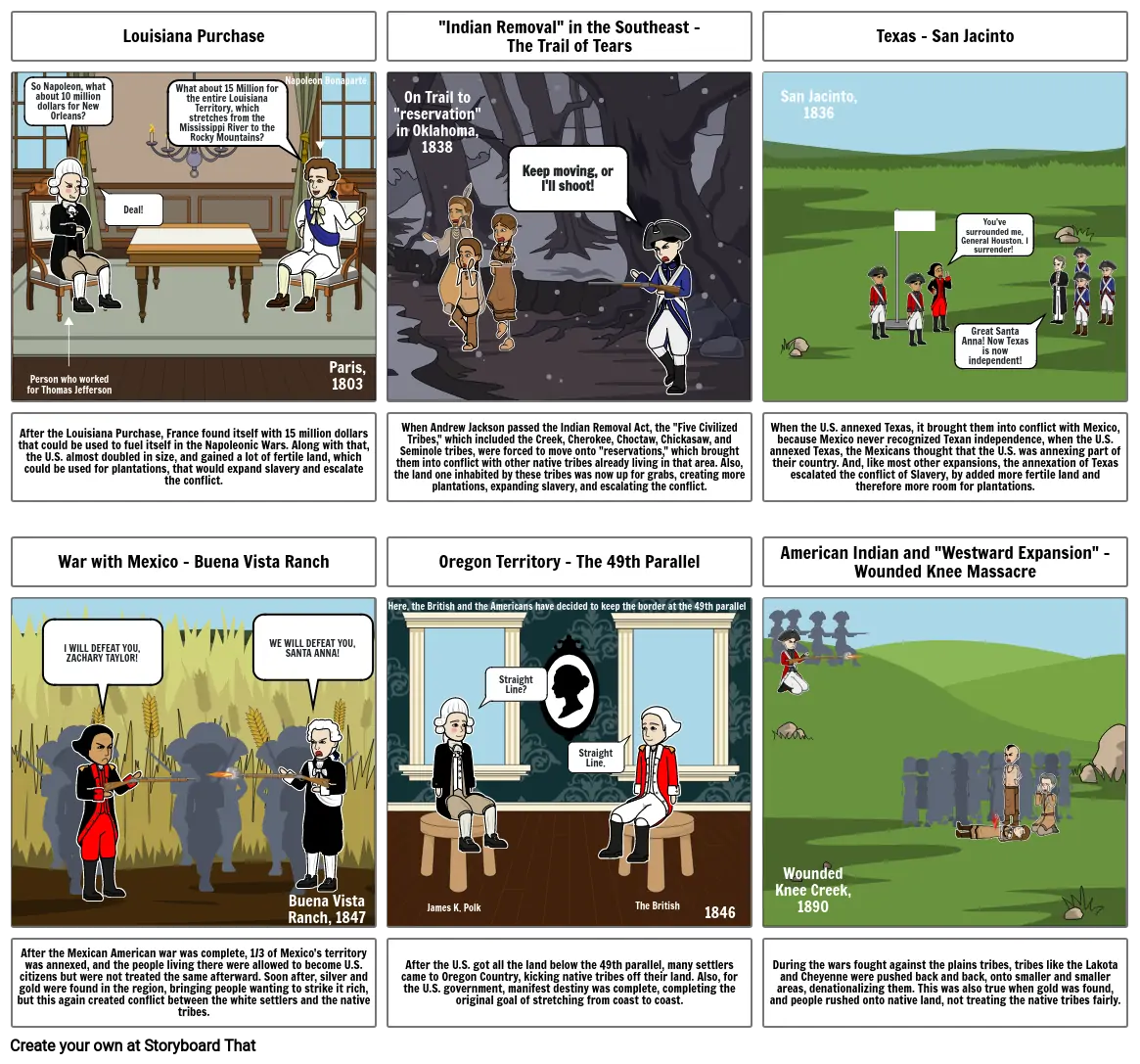Expansion Comic

Storyboard Tekst
- Louisiana Purchase
- So Napoleon, what about 10 million dollars for New Orleans?
- Deal!
- What about 15 Million for the entire Louisiana Territory, which stretches from the Mississippi River to the Rocky Mountains?
- Napoleon Bonaparte
- "Indian Removal" in the Southeast - The Trail of Tears
- On Trail to "reservation" in Oklahoma, 1838
- Keep moving, or I'll shoot!
- Texas - San Jacinto
- San Jacinto, 1836
- You've surrounded me, General Houston. I surrender!
- Great Santa Anna! Now Texas is now independent!
- After the Louisiana Purchase, France found itself with 15 million dollars that could be used to fuel itself in the Napoleonic Wars. Along with that, the U.S. almost doubled in size, and gained a lot of fertile land, which could be used for plantations, that would expand slavery and escalate the conflict.
- War with Mexico - Buena Vista Ranch
- Person who worked for Thomas Jefferson
- I WILL DEFEAT YOU, ZACHARY TAYLOR!
- WE WILL DEFEAT YOU, SANTA ANNA!
- Paris, 1803
- When Andrew Jackson passed the Indian Removal Act, the "Five Civilized Tribes," which included the Creek, Cherokee, Choctaw, Chickasaw, and Seminole tribes, were forced to move onto "reservations," which brought them into conflict with other native tribes already living in that area. Also, the land one inhabited by these tribes was now up for grabs, creating more plantations, expanding slavery, and escalating the conflict.
- Oregon Territory - The 49th Parallel
- Here, the British and the Americans have decided to keep the border at the 49th parallel
- Straight Line?
- When the U.S. annexed Texas, it brought them into conflict with Mexico, because Mexico never recognized Texan independence, when the U.S. annexed Texas, the Mexicans thought that the U.S. was annexing part of their country. And, like most other expansions, the annexation of Texas escalated the conflict of Slavery, by added more fertile land and therefore more room for plantations.
- American Indian and "Westward Expansion" - Wounded Knee Massacre
- After the Mexican American war was complete, 1/3 of Mexico's territory was annexed, and the people living there were allowed to become U.S. citizens but were not treated the same afterward. Soon after, silver and gold were found in the region, bringing people wanting to strike it rich, but this again created conflict between the white settlers and the native tribes.
- Buena Vista Ranch, 1847
- After the U.S. got all the land below the 49th parallel, many settlers came to Oregon Country, kicking native tribes off their land. Also, for the U.S. government, manifest destiny was complete, completing the original goal of stretching from coast to coast.
- James K. Polk
-
- Straight Line.
- The British
-
- 1846
- During the wars fought against the plains tribes, tribes like the Lakota and Cheyenne were pushed back and back, onto smaller and smaller areas, denationalizing them. This was also true when gold was found, and people rushed onto native land, not treating the native tribes fairly.
- Wounded Knee Creek, 1890
Over 30 millioner storyboards opprettet

